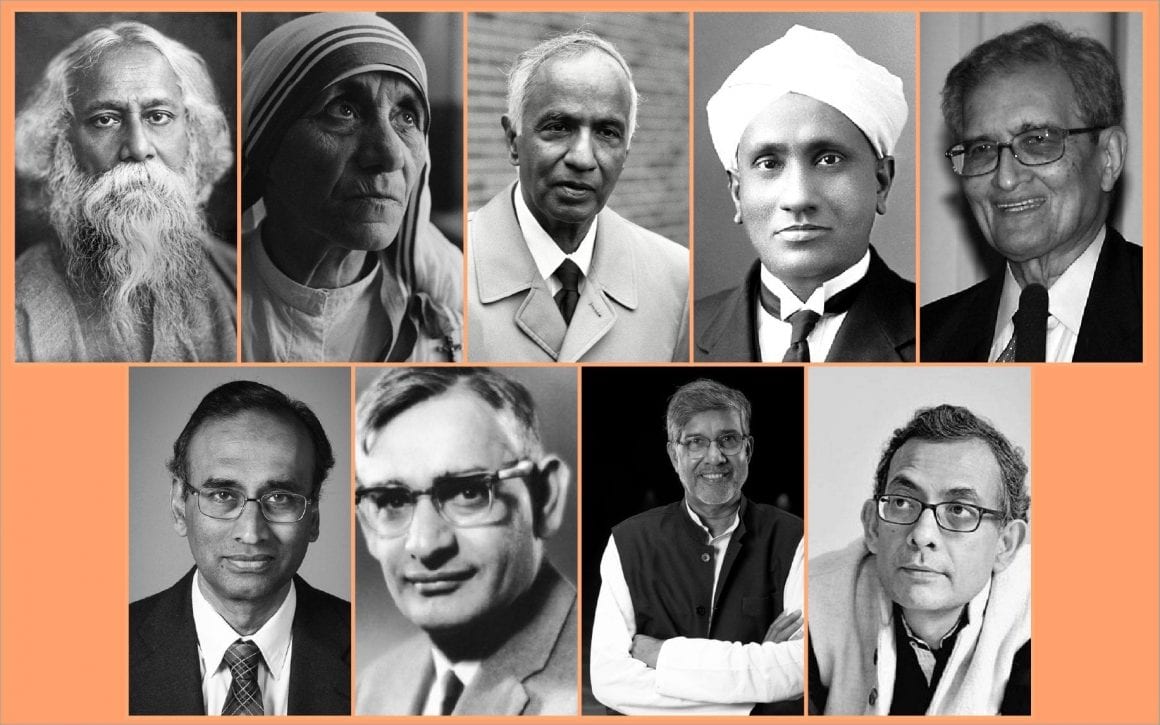Indian Nobel Prize Winners: A Legacy of Excellence

The Nobel Prize, one of the most prestigious honors in the world, acknowledges individuals who have made groundbreaking contributions in various fields including Physics, Chemistry, Medicine or Physiology, Literature, Peace, and Economic Sciences. India, with its rich history of intellectuals, scientists, and activists, has seen several of its citizens or those of Indian origin receive this accolade. Here's an in-depth look at the Indian Nobel laureates from 1913 to 2024:
Literature
1. Rabindranath Tagore (1913)
- Field: Literature
- Achievement: Tagore was awarded the Nobel Prize for his collection of poems, "Gitanjali," which translates to "Song Offerings." He was the first non-European to win the Nobel Prize in Literature, making him also the first Asian laureate. His work was noted for its profound sensitivity, freshness, and beauty. His poetry, characterized by its spiritual and universal themes, helped introduce Indian culture to the Western world.
Physics
2. Sir Chandrasekhara Venkata Raman (C.V. Raman) (1930)
- Field: Physics
- Achievement: Raman won for his discovery of the "Raman Effect," a phenomenon where light changes its wavelength when passing through a transparent material. This discovery was pivotal in spectroscopy and has applications in physics, chemistry, and biology. He was the first Asian to receive a Nobel Prize in any scientific field.
3. Subrahmanyan Chandrasekhar (1983)
- Field: Physics
- Achievement: Chandrasekhar's work focused on the theoretical studies of the physical processes important to the structure and evolution of stars. His most famous contribution, the Chandrasekhar limit, explains the maximum mass of a stable white dwarf star. He shared the prize with William A. Fowler, who studied the nuclear reactions in stars.
Physiology or Medicine
4. Har Gobind Khorana (1968)
- Field: Physiology or Medicine
- Achievement: Khorana was recognized for his interpretation of the genetic code and its function in protein synthesis. His work included the synthesis of the first artificial gene, significantly advancing the fields of genetics and molecular biology. Although born in India, he conducted much of his Nobel-winning research in the United States.
Peace
5. Mother Teresa (1979)
- Field: Peace
- Achievement: Born Agnes Gonxha Bojaxhiu in Skopje (now North Macedonia) but naturalized as an Indian citizen, Mother Teresa was awarded the Nobel Peace Prize for her work among the poorest of the poor in Calcutta (now Kolkata). She founded the Missionaries of Charity, which continues to help the destitute worldwide.
6. Kailash Satyarthi (2014)
- Field: Peace
- Achievement: Satyarthi was honored for his struggle against the suppression of children and young people and for the right of all children to education. His organization, Bachpan Bachao Andolan, has been instrumental in rescuing children from slavery and child labor, influencing policy changes at both national and international levels.
Economic Sciences
7. Amartya Sen (1998)
- Field: Economic Sciences
- Achievement: Sen's work in welfare economics has significantly shaped the understanding of poverty, famine, and human development. His capability approach has influenced development theory and policy, emphasizing individual freedoms and capabilities as the basis for economic development.
8. Abhijit Banerjee (2019)
- Field: Economic Sciences
- Achievement: Born in Mumbai, Banerjee shared the Nobel with Esther Duflo and Michael Kremer for their experimental approach to alleviating global poverty. Their methodology involves randomized controlled trials to test development strategies, providing empirical evidence for poverty reduction policies.
9. Venkatraman Ramakrishnan (2009)
- Field: Chemistry
- Achievement: Although born in India, Ramakrishnan's work was primarily conducted abroad. He received the Nobel Prize in Chemistry for his studies concerning the structure and function of the ribosome, shared with Thomas A. Steitz and Ada E. Yonath. His contributions to understanding protein synthesis at the molecular level are profound.
Impact and Legacy
The achievements of these Indian Nobel laureates have not only brought immense pride to India but have also significantly contributed to global knowledge and humanitarian efforts. Their work spans across different disciplines, from the cosmic to the molecular, from poetry to economics, showcasing the wide range of Indian intellectual influence. The legacy of these laureates continues to inspire generations, promoting research, peace, and cultural exchange.
Notable Observations:
- The diversity in fields where Indians have won Nobel Prizes reflects the broad spectrum of contributions from the country.
- Despite India's large population and significant scientific community, only a few have won while working in India, highlighting the need for improved research facilities and recognition within the country.
- The contributions of these laureates have had lasting impacts, influencing policy, science, literature, and humanitarian efforts worldwide.
Conclusion
India's Nobel laureates have left an indelible mark on the world, proving that excellence knows no boundaries. Their stories are not just of personal achievement but are emblematic of the potential for greatness within India's vast intellectual landscape. As we look forward, the legacy of these laureates continues to challenge and inspire future generations to strive for global recognition in their fields, fostering a culture of innovation, peace, and knowledge.
